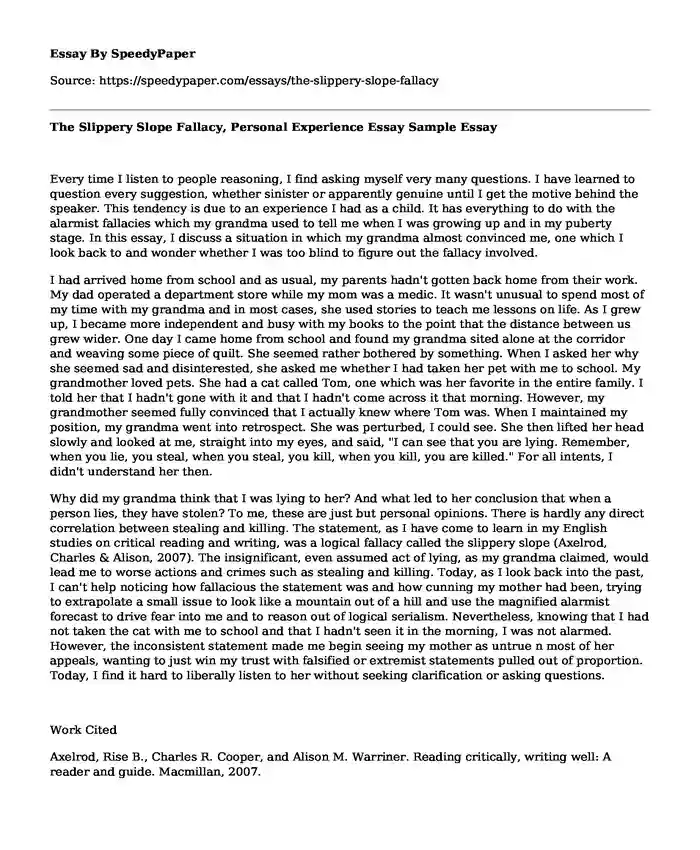
| Type of paper: | Essay |
| Categories: | Personal experience |
| Pages: | 3 |
| Wordcount: | 598 words |
Every time I listen to people reasoning, I find asking myself very many questions. I have learned to question every suggestion, whether sinister or apparently genuine until I get the motive behind the speaker. This tendency is due to an experience I had as a child. It has everything to do with the alarmist fallacies which my grandma used to tell me when I was growing up and in my puberty stage. In this essay, I discuss a situation in which my grandma almost convinced me, one which I look back to and wonder whether I was too blind to figure out the fallacy involved.
I had arrived home from school and as usual, my parents hadn't gotten back home from their work. My dad operated a department store while my mom was a medic. It wasn't unusual to spend most of my time with my grandma and in most cases, she used stories to teach me lessons on life. As I grew up, I became more independent and busy with my books to the point that the distance between us grew wider. One day I came home from school and found my grandma sited alone at the corridor and weaving some piece of quilt. She seemed rather bothered by something. When I asked her why she seemed sad and disinterested, she asked me whether I had taken her pet with me to school. My grandmother loved pets. She had a cat called Tom, one which was her favorite in the entire family. I told her that I hadn't gone with it and that I hadn't come across it that morning. However, my grandmother seemed fully convinced that I actually knew where Tom was. When I maintained my position, my grandma went into retrospect. She was perturbed, I could see. She then lifted her head slowly and looked at me, straight into my eyes, and said, "I can see that you are lying. Remember, when you lie, you steal, when you steal, you kill, when you kill, you are killed." For all intents, I didn't understand her then.
Why did my grandma think that I was lying to her? And what led to her conclusion that when a person lies, they have stolen? To me, these are just but personal opinions. There is hardly any direct correlation between stealing and killing. The statement, as I have come to learn in my English studies on critical reading and writing, was a logical fallacy called the slippery slope (Axelrod, Charles & Alison, 2007). The insignificant, even assumed act of lying, as my grandma claimed, would lead me to worse actions and crimes such as stealing and killing. Today, as I look back into the past, I can't help noticing how fallacious the statement was and how cunning my mother had been, trying to extrapolate a small issue to look like a mountain out of a hill and use the magnified alarmist forecast to drive fear into me and to reason out of logical serialism. Nevertheless, knowing that I had not taken the cat with me to school and that I hadn't seen it in the morning, I was not alarmed. However, the inconsistent statement made me begin seeing my mother as untrue n most of her appeals, wanting to just win my trust with falsified or extremist statements pulled out of proportion. Today, I find it hard to liberally listen to her without seeking clarification or asking questions.
Work Cited
Axelrod, Rise B., Charles R. Cooper, and Alison M. Warriner. Reading critically, writing well: A reader and guide. Macmillan, 2007.
Cite this page
The Slippery Slope Fallacy, Personal Experience Essay Sample. (2022, Mar 02). Retrieved from https://speedypaper.net/essays/the-slippery-slope-fallacy
Request Removal
If you are the original author of this essay and no longer wish to have it published on the SpeedyPaper website, please click below to request its removal:
- Survey Questions
- Essay Example on Nuclear Waste Problem
- Free Essay on Psychological Foundations of Curriculum
- Free Essay Sample on Domestic Security and Cyber-Terrorism
- Free Essay on Organizational Management and Culture
- Free Essay. How the Convict Labor System Was Worse Than Slavery
- Essay Sample. Application for a Scholarship
Popular categories




